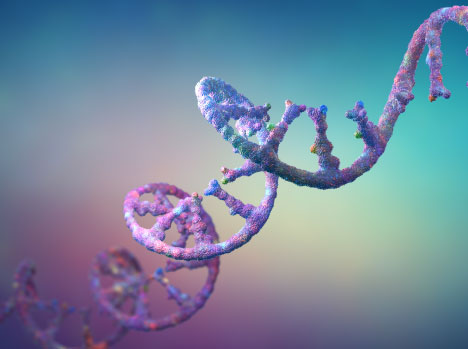Several biotech companies, including Moderna, are exploring the use of mRNA infusions to enhance the body’s immune cells for fighting cancer and other diseases, offering a novel approach to CAR-T cell therapies. Instead of the labor-intensive process of extracting, engineering, and reinfusing a patient’s immune cells, mRNA-based therapies aim to streamline the process while providing similar benefits. This innovative approach involves engineering cells directly within the body, potentially simplifying treatment and reducing side effects. Companies like Carisma Therapeutics, Capstan Therapeutics, and Orna Therapeutics are presenting promising data at medical conferences, though multiple doses may be needed due to the short lifespan of mRNA. Human trials are planned for the future, with potential applications in cancer and autoimmune disease treatment.
Carisma Therapeutics is exploring an innovative approach to cancer treatment by using mRNA-infused lipid nanoparticles in collaboration with Moderna. They have developed engineered macrophages (CAR-M) to target solid tumors, capitalizing on these cells’ ability to infiltrate tumor environments. In a mouse study on metastatic pancreatic cancer, CAR-M therapy effectively reduced cancer spread and controlled metastasis in the livers and lungs. This “Trojan horse” approach could revolutionize cancer treatment. The Carisma-Moderna partnership may lead to milestone payments of around $250 million for up to twelve targets, though human trials’ timing remains undisclosed.
CAR-T cell therapies have demonstrated remarkable success in treating blood cancers like leukemia and lymphoma, but they pose challenges related to cost and accessibility, hindering their expansion into other diseases such as autoimmune conditions. Haig Aghajanian, Capstan’s head of research and co-founder, highlights the access issue, particularly for larger patient populations. Many efforts have aimed to develop off-the-shelf CAR-T therapies using generic stem cells, but success has been limited, with several therapies struggling to provide long-term cancer control. Capstan presented promising early results at a conference, suggesting their treatment could halt tumor growth in mice. The company, born from previous research involving prominent scientists like Carl June, Bruce Levine, and Drew Weissman, the Nobel Prize laureate for his work on mRNA, is developing therapies for cancer and autoimmune diseases, leveraging antibodies in lipid nanoparticles to target specific T cells in the spleen. Clinical trial timelines remain undisclosed.
Orna Therapeutics is pioneering circular RNA, a variation of mRNA, to extend CAR protein expression, potentially reducing cytokine release syndrome risks. In a mouse study, bi-weekly infusions of their therapy maintained nearly undetectable leukemia levels over eight weeks. Orna’s approach is likened to recombinant protein therapy, providing transient effects. Rodent and monkey studies are ongoing, with the company’s first clinical trial for blood cancers scheduled in 2024, aiming for dosing every two to three weeks. Meanwhile, other companies like Umoja Biopharma are exploring in vivo CAR-T approaches using viral vectors, with plans to test blood cancers and gynecologic tumors in the coming years.

Check out our mRNA service to expedite your vaccine research
PackGene Biotech is a world-leading CRO and CDMO, excelling in AAV vectors, mRNA, plasmid DNA, and lentiviral vector solutions. Our comprehensive offerings span from vector design and construction to AAV, lentivirus, and mRNA services. With a sharp focus on early-stage drug discovery, preclinical development, and cell and gene therapy trials, we deliver cost-effective, dependable, and scalable production solutions. Leveraging our groundbreaking π-alpha 293 AAV high-yield platform, we amplify AAV production by up to 10-fold, yielding up to 1e+17vg per batch to meet diverse commercial and clinical project needs. Moreover, our tailored mRNA and LNP products and services cater to every stage of drug and vaccine development, from research to GMP production, providing a seamless, end-to-end solution.
Related News
Exploring Tau Protein’s Role in Glaucoma: New Insights and Therapeutic Potential
Glaucoma, a chronic neurodegenerative disorder, leads to irreversible vision loss by damaging retinal ganglion cells (RGCs) and the optic nerve, often associated with increased intraocular pressure (IOP). Despite the benefits of IOP-lowering treatments, the underlying...
FDA-mandated CAR-T monitoring period could be halved, say researchers
In patients with diffuse large B-cell non-Hodgkin lymphoma (DLBCL), the two hallmark post-chimeric antigen receptor (CAR)-T therapy toxicities are extremely rare after two weeks, supporting a shorter, more flexible toxicity monitoring period, according to a study...
Ancestral CRISPR-Cas13 Ribonucleases Discovered: Implications for Genome Editing
In a pioneering study published in *Science*, a team of researchers led by Peter H. Yoon and Jennifer A. Doudna from the University of California, Berkeley, has made a remarkable discovery in the realm of CRISPR technology. The team has identified an ancestral clade...
KBI Biopharma Expands Manufacturing Contract with Global Pharmaceutical Company
KBI Biopharma Inc., a JSR Life Sciences company and global cGMP contract development and manufacturing organization (CDMO), has extended and expanded its manufacturing contract with a leading global pharmaceutical company. Originally initiated in 2020, the renewed...
Related Services

